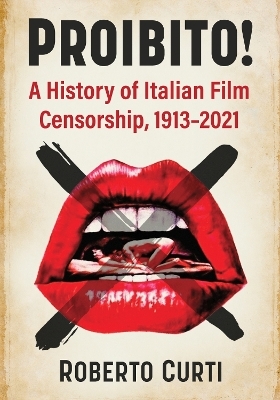
Proibito!
A History of Italian Film Censorship, 1913-2021
Seiten
2024
McFarland & Co Inc (Verlag)
978-1-4766-8856-5 (ISBN)
McFarland & Co Inc (Verlag)
978-1-4766-8856-5 (ISBN)
- Lieferbar (Termin unbekannt)
- Versandkostenfrei
- Auch auf Rechnung
- Artikel merken
Analyses the history of Italian film censorship from its early days to the present, discussing the most controversial cases and protagonists. These include such notorious works as Last Tango in Paris and Salo or the 120 Days of Sodom, and groundbreaking filmmakers such as Luchino Visconti, Federico Fellini and Pier Paolo Pasolini.
From its birth in 1913 to its abolition in 2021, film censorship marked the history of Italian cinema, and its evolution mirrored the social, political, and cultural travail of the country. During the Fascist regime and in the postwar period, censorship was a powerful political tool in the hands of the ruling party, resulting in many films being banned or severely cut. By the end of the 1960s, censors had to cope with the changing morals and the widespread diffusion of sexuality in popular culture, which led to the boom of hardcore pornography. With the crisis of the national industry and the growing influence of television, censorship gradually changed its focus and targets.The book analyzes the history of Italian film censorship from its early days to the present, discussing the most controversial cases and protagonists. These include such notorious works as Last Tango in Paris and Salo or the 120 Days of Sodom, and groundbreaking filmmakers such as Luchino Visconti, Federico Fellini and Pier Paolo Pasolini, who pushed the limits of what was acceptable on screen, causing scandal and public debate.
From its birth in 1913 to its abolition in 2021, film censorship marked the history of Italian cinema, and its evolution mirrored the social, political, and cultural travail of the country. During the Fascist regime and in the postwar period, censorship was a powerful political tool in the hands of the ruling party, resulting in many films being banned or severely cut. By the end of the 1960s, censors had to cope with the changing morals and the widespread diffusion of sexuality in popular culture, which led to the boom of hardcore pornography. With the crisis of the national industry and the growing influence of television, censorship gradually changed its focus and targets.The book analyzes the history of Italian film censorship from its early days to the present, discussing the most controversial cases and protagonists. These include such notorious works as Last Tango in Paris and Salo or the 120 Days of Sodom, and groundbreaking filmmakers such as Luchino Visconti, Federico Fellini and Pier Paolo Pasolini, who pushed the limits of what was acceptable on screen, causing scandal and public debate.
Roberto Curti is an Italian film historian and the author of numerous published books and articles. He lives in Cortona, Italy.
Table of Contents
Acknowledgments
Introduction
1. The Early Days of Film Censorship in Italy
2. Film Censorship and the Fascist Regime
3. The Christian Democrat Years
4. A New Law on Censorship
5. Film Censorship and the Changing Face of Cinema After 1968
6. The Magistracy's War Against Obscenity
7. Obscenity, Art, and the Common Sense of Modesty
8. Film Censorship and Pornography
9. Old and New Tendencies in Film Censorship,
deletefrom the 1980s and Onward
10. The Last Days of Film Censorship in Italy
Chapter Notes
Bibliography
Index
| Erscheinungsdatum | 22.09.2023 |
|---|---|
| Zusatzinfo | 49 photos |
| Verlagsort | Jefferson, NC |
| Sprache | englisch |
| Maße | 178 x 254 mm |
| Themenwelt | Kunst / Musik / Theater ► Film / TV |
| Geisteswissenschaften ► Geschichte ► Regional- / Ländergeschichte | |
| Sozialwissenschaften ► Kommunikation / Medien ► Medienwissenschaft | |
| ISBN-10 | 1-4766-8856-7 / 1476688567 |
| ISBN-13 | 978-1-4766-8856-5 / 9781476688565 |
| Zustand | Neuware |
| Informationen gemäß Produktsicherheitsverordnung (GPSR) | |
| Haben Sie eine Frage zum Produkt? |
Mehr entdecken
aus dem Bereich
aus dem Bereich
Erinnerungen
Buch | Softcover (2024)
Pantheon (Verlag)
CHF 22,40


